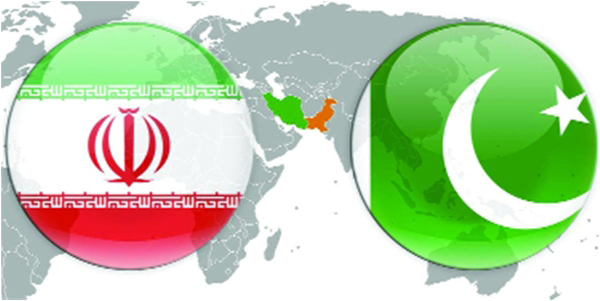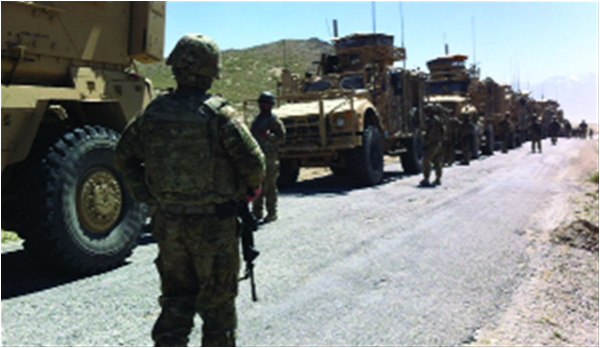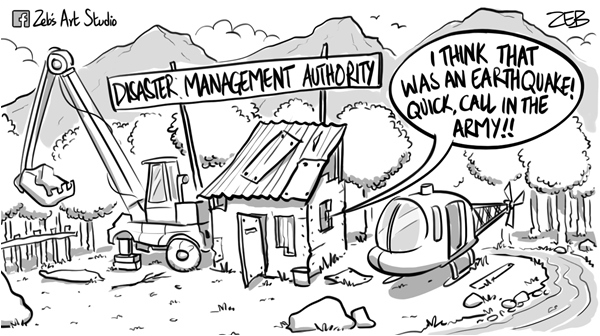
The Mina tragedy
Sir,
This refers to the tragedy that took place at Mina on September 22, 2015 during the annual Hajj. Thousands of pilgrims died and a very large number were injured due to a stampede. The moment the news of that tragic incident started flushing on our TV screens, various theories started pouring on the electronic media, newspapers and social media, with some of them even crossing norms of decency, and not even caring for the families of those who suffered martyrdom at the holy place. Without bothering to find out the actual facts and reasons for that tragic event, several people rushed to put the entire blame on the Saudi Arabian government. It was a very senseless behavior on the part of those ill-informed people, with most not even knowing the location and arrangements the Saudi government undertakes every year to accommodate millions of pilgrims.
In 2013, I was one of those privileged and fortunate enough to join the millions going for pilgrimage, and got to witness the largest gathering of human beings at one place. Before departing for Hajj, I had many fears in my mind, long delays, chaos, undisciplined staff at airports, but all my fears proved to be wrong the moment I landed in Jeddah.
Throughout the Hajj process, even the minute details were taken care of; in Mina, the tents were kept cleaned and well ventilated with adequate arrangements of cooling. As soon as I returned though it was a different story. Upon reaching Lahore, I witnessed people returning from the holy land, fighting at the luggage conveyor belt, pushing ladies and old people to collect their baggage, and abusing each other while outside the airport building. Instead of blaming the Saudi government, we the people from all over the world must remain disciplined and orderly, and respect the rules set by the host country.
Aamir Aqil,
Lahore.
Chota Rajan
Sir,
Who is Chota Rajan, the man arrested the other day on Bali Island? Why was he wanted in India for more than two-dozen murder cases? Why did he use cyanide to kill his victims, mostly women? What was so special about him that India kept tracking his movements so closely, and informed the police in Indonesia and Australia? One wonders if, Rajendra Nikalje, his real name, has been “on the Interpol’s wanted list since 1995 for running a crime syndicate that engaged in extortion, arms smuggling and contract killing”.
One recalls Chota Rajan’s recorded and widely-reported involvement in supplying arms and funding the BLA and safely trafficking its activists to Iran and Afghanistan. Refer to the investigative report published in the Daily Mail. Rajan had also been staying in the UAE, Afghanistan and other countries, reportedly working to execute RAW-directed operations inside Pakistan. It is unclear whether the man was tracked to really prosecute him or bring him under protective custody to hide his acts of sabotage, subversion and terrorism from the world at large. One believes that the dossiers handed over to the US, UN and the Indian government very much include a massive list of RAW agents and handlers.
Pakistan must also hand over a copy of the dossier to the Indonesian government, and under that pretext, demand Chota Rajan’s handing over to Islamabad. If that is not possible, then the Pakistani government should formally ask the Indian government for Chota Rajan’s handing over to Pakistan for his involvement in numerous acts of violence, sabotage, terrorism and running terrorist networks inside Pakistan, so that he may be tried in a court of law. It is also advisable for Pakistan to revisit its policy of appeasement towards India.
Hamza Ali,
Islamabad.

Positive Shift
Sir,
It is a matter of great satisfaction that the Iranian government is taking a keen interest in joining hands with Pakistan towards resolving the Afghan imbroglio, as the emerging situation, after the fall of Kunduz, has sent warning shots to both countries. Keeping in view the ISIS presence, Pakistan has welcomed Iran’s offer of playing a role in the Afghan talks. Both countries have realised that the complex Afghan issue cannot be resolved alone, without involving neighbouring countries, especially Iran. This positive shift in the Pakistan-Iran relations and continuous strengthening of ties holds the key towards regional peace.
The talks were held with Ali Shamkhani, the secretary of Iran’s Supreme National Security Council, who arrived in Islamabad on a two-day visit for talks on security cooperation and border issues. Shamkhani holds a very important position in Tehran; he is close to Iran’s Supreme Leader Ayatollah Khamenei. He has a long career of serving the Iranian Navy, from where he retired as rear admiral. Recently, he served as the defence minister of Iran, and was made secretary of the SNSC, which looks after defence and security policies, especially of Gulf countries.
There was a long pause in such kind of talks, probably because of Iran’s mistrust when it came to Pakistan, but thanks to the successful Operation Zarb-e-Azb and Islamabad’s facilitation in holding talks with the Taliban, this has changed the entire perception around the world, especially amongst our neighbouring countries. Zarb-e-Azb should be credited for the White House inviting Nawaz Sharif; Russian President Vladimir Putin is likely to visit Islamabad, India is near willing to talk, and the government has gained confidence.
Shamkhani held talks with Sartaj Aziz, adviser on foreign affairs, and Nasser Janjua, the new national security adviser, reportedly on Afghanistan, border security, intelligence sharing, the presence of ISIS in the region, security cooperation and exploring the prospects of bilateral cooperation. Border security between Pakistan and Iran remains a sensitive issue, since there have been frequent border checks over illegal immigrants’ entry into Iran. The infiltration of terrorists and enemy agents into Balochistan from the Iranian side is also a major issue for Pakistan. Iran had earlier this year also offered cooperation to the Shanghai Cooperation Organisation countries for countering terrorism.
F Z Khan,
Rawalpindi.

Pakistan a profitable market
Sir,
Prime Minister of Pakistan Muhammad Nawaz Sharif has said that Pakistan is emerging as a lucrative market for foreign investors. This, he said, is due to the improving security situation, successes achieved in the war against terrorism and improvement in the country’s economy. The PM made these remarks while addressing a luncheon hosted in his honor by the US-Pakistan Chamber of Commerce and US Chamber of Commerce in Washington on Wednesday.
The confidence with which the PM made these remarks at the august forum of the US-Pakistan Chamber of Commerce and the US Chamber of Commerce was based on the significant improvement that has taken place in macroeconomic indicators, coupled with a sharp decline in the number of terrorist attacks in the country. Beyond any doubt, Pakistan has attained considerable improvement in its internal security situation. It has also achieved effective governance and public service delivery, which has given a boost to the country’s declining economy.
Improvement in Pakistan’s economy is being positively looked at worldwide. Global publications, funds’ managers and rating agencies of repute have duly recognised Pakistan’s exceptional economic performance. Bloomberg L.P., a privately held financial software, data, and media company, headquartered in Midtown Manhattan, New York City, has described Pakistan as the best undiscovered frontier market. The vice president of Morgan Stanley, a New York-based American multinational financial services corporation, has predicted that the economic resurgence of Pakistan is on account of its strategic location and demographic dividends. Moody’s has also raised Pakistan from CAA 1 to B-., while Fitch Ratings Inc. one of the three nationally recognised statistical rating organisations designated by the US Securities and Exchange Commission, has given a rating of B to Pakistan. It is said that all these positive ratings have been made by the above organisations of international renown on the basis of the significant turnaround in the country’s economy.
Everything sounds very encouraging indeed. What, however, is bothersome and raises serious concerns is the ongoing political turmoil in the country. The element of cooperation and understanding among the leading political factions, particularly on critical national issues, is terribly missing. It is sadly disappointing that despite knowing that the country is passing through its most critical times in history, every political group is harping a different tune, a tune that serves their interests the best. Unanimity of thought and actions among leading political factions, on critical national issues, is the need of the hour. If Pakistan is to sustain the credible successes it has achieved in the realm of its economy, in the war against terrorism, and other areas of national importance political stability will have to be ensured at all cost. The political forces, regardless of their political differences, will have to unite, at least on key national issues, in the larger interest of this nation and this country.
Fazal Elahi,
Islamabad.

Hajj directorate appointments
Sir,
This is reference to the Lahore High Court having to intervene to nullify the political appointment by the PM of Rafiq Bashir Shah, nephew of Opposition leader Syed Khurshid Shah, as Hajj director, based in Jeddah. Why should the PM have to write a letter to the Saudi government to request the extension after his tenure and visa had expired in December 2014?
Given that PM Gillani, followed by PM Raja Ashraf, and now PM Nawaz Sharif, have all been involved in political appointments of the Hajj director, our pilgrims have had their woes multiplied, and their discomfort and exploitation have become more acute. From the fleecing of pilgrims to making their pilgrimage a never ending misery during the tenure of YRG to the recent tragedy where almost a thousand Pakistanis perished in the recent crane collapse and tragic stampede at Mina, to the ordeal of their next of kin, many of whom still await the fate of their dear ones. Can PM and the leader of the opposition visualise the pain of those not knowing whether their loved ones are alive or are dead? Even the national flag carrier PIA had no qualms in appointing a pilot whose basic qualifications have been declared fake as Hajj coordinator, in service on a stay order. This is the bitter ugly truth, and yet we think that God’s wrath will not fall upon us, just because we are Muslims by name, even though in practice we act like hypocrites.
Aneela Chandio,
Sukkur.

US troops stay on
Sir,
While the US has extended its troops’ stay in Afghanistan, this doesn’t mean that Washington is not convinced that there is no military solution to the conflict within the country. Time has come that all stakeholders, including allied countries, must arrive at a conclusion that the negotiations option has to be applied so as to end the misery of the Afghan people. If the end result is talks, then India must also be advised to stop going for adventures via Afghanistan. This would be counterproductive for peace for another decade or so. Also, then there is a possibility of a fresh wave of refugees’ exodus. Already, after Kunduz, thousands of people have been displaced. Many of them wanted to go to Europe and were joining the Syrian refugees, but they were identified as Afghans, and therefore arrested and deported. Iran is also not accepting them. So the pressure will be on Pakistan to accept them. But this time, no one in Pakistan is willing to welcome the Afghans. Ashraf Ghani, Abdullah and other officials’ statements have been highly discouraging. Secondly, this time there is a likelihood of Indian agents entering Pakistan posing as refugees. Nawaz Sharif rightly said there is no military solution to the conflict and offered to continue efforts to bring the Taliban back to the table, but the US demands confirm that India has a deeper influence and both have deeper alliances with each other. This would certainly force Pakistan to continue pursuing maintenance of balance of power in the region. Whereas the US, according to the NYT, had been attempting to secretly convince Pakistan to limit its nuclear programme, Islamabad is likely to accept no pressure of any sort even if India does so.
Eschmall Sardar,
Peshawar.

Disaster management failures
Sir,
The victims of the 2005 earthquake, and flood disasters thereafter still await rehabilitation after 10 years with over $5 billion in foreign aid unaccounted for and yet another natural calamity hitting the country on October 26, 2015. In 2005, we had Musharraf, in uniform, was president with an ‘imported’ PM, Shaukat Aziz. They were then followed by an elected coalition government, headed by PPP’s Asif Zardari, in 2008, and now finally Nawaz Sharif is the PM in 2013. Numerous organisations such as NDMA, ERRA, Crisis Management etc have been created, with monumental administrative costs put on the taxpayer, but no concrete achievement for specific objectives, namely relief, rehabilitation and preventive measures for most deprived and vulnerable victims of natural or manmade disasters.
Disaster management is a specialised field, where trained qualified professionals work with seismologists, engineers, and doctors, utilising disciplined and well-equipped members of armed forces for relief and rescue operations all over the world, and plan for prevention of loss of life and property in future. Unfortunate, reality is that Pakistan lies on Hindu Kush fault line and these earthquakes are likely to occur, along with floods, because of failed water management system and both federal and provincial governments must prepare themselves to meet eventualities and put in place infrastructure to minimise human suffering and damage to private property and agricultural land. Those responsible for criminal negligence should be hanged for culpable homicide.
Despite these recurring disasters and colossal losses, organisations set up to face these problems have become dumping grounds for retired civil and uniformed officers, or cronies, lacking capacity and training to meet these dangers, for which specialised personnel are required, with minimal administrative expenditure and perks. The sacrifices of our soldiers and resources to combat terrorism in Zarb-e-Azb and NAP would be in vain, if the breeding nurseries for the recruitment of men and women driven to desperation by injustices and criminal neglect by the state as a consequence of disasters are not addressed properly by providing basic needs of housing, education, health and employment to those who are the most deprived. Unless the welfare of masses and development of human resources takes priority over the welfare of paid government servants and vested lobbies in civil and khaki bureaucracy, Pakistan’s economy will continue to bleed and the state will be prone to terrorism and anarchy.
Malik Tariq Ali,
Lahore.

